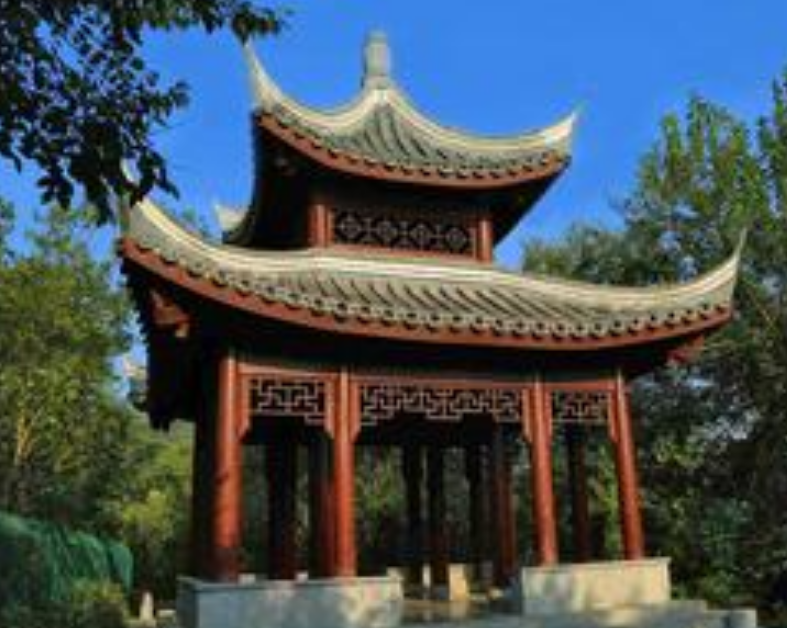(单词翻译:单击)
小编导读:《丰乐亭记》是北宋文学家欧阳修创作的一篇散文。这篇文章除记述建丰乐亭的经过及与滁人共游之乐外,还描绘了滁州从战乱到和平的变迁,从而寄托了安定来之不易,应予珍惜的命意和与民同乐的政治思想。

《丰乐亭记》 欧阳修
修既治滁之明年,夏始饮滁水而甘。问诸滁人,得于州南百步之远。其上则丰山,耸然而特立;下则幽谷,窈然而深藏;中有清泉,滃然而仰出。俯仰左右,顾而乐之。于是疏泉凿石,辟地以为亭,而与滁人往游其间。
滁于五代干戈之际,用武之地也。昔太祖皇帝,尝以周师破李景兵十五万于清流山下,生擒其皇甫晖、姚凤于滁东门之外,遂以平滁。修尝考其山川,按其图记,升高以望清流之关,欲求晖、凤就擒之所。而故老皆无在也,盖天下之平久矣。
自唐失其政,海内分裂,豪杰并起而争,所在为敌国者,何可胜数。及宋受天命,圣人出而四海一;向之凭恃险阻,铲削消磨,百年之间,漠然徒见山高而水清。欲问其事,而遗老尽矣。今滁介江淮之间,舟车商贾、四方宾客之所不至,民生不见外事,而安于畎亩衣食,以乐生送死。而孰知上之功德,休养生息,涵煦于百年之深也。
修之来此,乐其地僻而事简,又爱其俗之安闲。既得斯泉于山谷之间,乃日与滁人仰而望山,俯而听泉;掇幽芳而荫乔木,风霜冰雪,刻露清秀:四时之景,无不可爱。又幸其民乐其岁物之丰成,而喜与予游也,因为本其山川,道其风俗之美,使民知所以安此丰年之乐者,幸生无事之时也。夫宣上恩德,以与民共乐,刺史之事也。遂书以名其亭焉。
The Pavilion of Plenty and Happiness
Ouyang Xiu
I did not know the sweet taste of the spring water in Chuzhou until the second summer after I came here to govern. I asked the local people and learned that its fountainhead was only about a hundred footsteps south from Chuzhou. Above it was the Mountain of Plenty, which rose upright and high. Below it was a deep and secluded valley, the depth of which was immeasurable. Midway was a spring which gushed upwards in torrents. I was pleased to look at it from all directions. Then I had the waterway dredged, rocks chiseled, and a flat space opened up. On it a pavilion was built, which I used to visit with the people of Chuzhou.
During the armed conflicts of the Five Dynasties, Chuzhou was a place where many battles had been fought. In former times, Emperor Taizu, leading an army of the Later Zhou Dynasty, defeated at the foot of Qingliu Mountain an army of one hundred and fifty thousand soldiers under the leadership of Li Jing, the Emperor of the Southern Tang Dynasty. Then Emperor Taizu restored order in Chuzhou afer capturing alive Huangfu Hui and Yao Feng outside its eastern city gate. I had inspected the mountain and the river around the place, climbed high to look at the gate of Qingliu Pass, and with the help of a map and records prepared beforehand, tried to locate the place where Huangfu Hui and Yao Feng were captured. But the old people who might know something about the fighting were all dead. For many years had passed since the country began to enjoy peace.
China was torn asunder after the last Emperor of the Tang Dynasty lost his power. Warlords surged up and fought with one another. Countries hostile to each other were too numerous to count. When the Song Dynasty received the mandate of Heaven , the Sage came out and the country was unified. Those warlords who had ruled different districts by relying on their strategic terrains were gradually wiped out. In the past one hundred years there had been peace everywhere. What I saw was the high mountain and clear water. None of the old people who could describe the past events survived. Chuzhou was situated between the Yangtze and the Huai rivers. No ships, carriages, merchants, and visitors from anywhere came. Its people had no contact with the outside world. They were contented with their rural life of simple food and clothing and never had anything to worry about. They did not know that they owed all this to the benevolence of the emperors whose recuperative and rehabilitating policy had benefited the people for a hundred years.
After I came here, I liked the place for its seclusion and its simple affairs of the government. I also liked the people's leisurely and carefree manner. Since I had found this clear spring, I used to come here with the people of Chuzhou. We would look up at the mountain and look down to listen to the murmuring of the spring. We would pluck wild flowers and rest in the shade of the trees. During the frosty and icy season, the place looked more pretty and graceful. It was lovable all year round. And, luckily the local people, happy with a good harvest, liked to enjoy themselves together with me. Therefore, while describing the beauty of nature, I praised the local people's simple and pure life style. I want the people to know that it was because they were living in times of peace that they were able to enjoy plentiful years. Since the duty of a cishi was to sing the praises of the Emperor's kindness and to share with people in their happiness, I wrote this essay and named the pavilion after it.
更多精品翻译素材,敬请关注可可英语。


